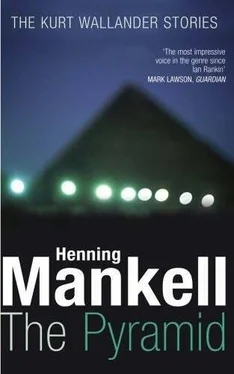And for that you have to stay on the ground.'
'I've heard that you kept the passenger lists,' Wallander said.
'It became an obsession,' Eklund said. 'I look through them sometimes. I don't remember most of them. Some names bring out memories. Most of them good, some that you'd rather forget.'
He got up and reached for a plastic sleeve on a shelf. He held it out to Wallander. It contained a list of thirty-two names. He picked out the name Lamberg almost immediately. He went slowly through the rest of the names, none of which had appeared in the context of the investigation before. More than half of the passengers came from the middle of Sweden. There was also a couple from Härnösand, a woman from Luleå, as well as seven individuals from southern Sweden. From Halmstad, Eslöv and Lund. Wallander passed the list to Svedberg.
'You said you had pictures from the trip? That Lamberg had taken?'
'Because of his profession, he was appointed our official photographer. He took almost all of the shots. Those who wanted copies wrote their names on a list. Everyone received what they had ordered. He kept his promises.'
Eklund lifted a newspaper. Under it there was an envelope with photographs.
'Lamberg gave me all of these free of charge. He had chosen them himself. I wasn't the one who picked them out.'
Wallander slowly looked through the stack of pictures. There were nineteen in all. He already sensed that Lamberg would not appear in any of them, since he had been behind the camera. But in the second-to-last one he appeared in a group shot. On the back someone had written that the photo had been taken in a rest area between Salzburg and Vienna. Even Eklund was in it. Wallander assumed that Lamberg had used a timer. He went through the stack one more time. Studied details and faces. Suddenly he noticed a woman's face that appeared again and again. She always stared straight into the camera. And smiled. When Wallander looked at her features, he had the feeling that there was something familiar about it, without being able to put his finger on what it was.
He asked Svedberg to take a look at them.
'What do you remember of Lamberg from that trip?'
'To begin with I didn't notice him very much. But then there was plenty of drama.'
Svedberg looked up quickly.
'What do you mean?' Wallander asked.
'Maybe one shouldn't talk about these kinds of things,' Eklund said hesitantly. 'He's dead now. But he got together with one of the ladies on the trip. And it was not an uncomplicated matter.'
'Why not?'
'Because she was married. And her husband was there.'
Wallander let this sink in.
'There was something else,' Eklund said, 'that probably didn't help matters much.'
'What was that?'
'She was a minister's wife. He was a man of the Church.'
Eklund pointed him out in one of the pictures. The hymn book flashed through Wallander's head. He realised he was sweating. He glanced at Svedberg. He had the feeling his colleague was having the same associations.
Wallander grabbed the stack of photographs, taking out one where the unknown woman was smiling at the camera.
'Is this her?' he asked.
Eklund looked at it and nodded.
'It is. Can you imagine? A minister's wife from a parish outside Lund.'
Wallander looked at Svedberg again.
'How did the whole thing end?'
'I don't know. And I'm not even sure if the minister discovered what was going on behind his back. To me he seemed very unaware of worldly things. But the whole situation on the trip was very uncomfortable.'
Wallander looked at the image of the woman. Suddenly he knew who she was.
'What is the name of this family?'
'Wislander. Anders and Louise.'
Svedberg studied the passenger list and wrote down their address.
'We need to borrow these photos for a while,' Wallander said. 'You'll get them back of course.'
Eklund nodded.
'I hope I haven't said too much,' he said.
'Quite the opposite. You've been a big help.'
They said goodbye, thanked him for the coffee and walked out onto the street.
'This woman fits the description of the woman who visits Matilda Lamberg,' Wallander said. 'I want to confirm that it is her, as soon as possible. Why she visits Matilda, I don't know. But that will have to be a later question.'
They hurried to the car and left Trelleborg. Before they left, however, Wallander called Ystad from a phone booth and, after considerable effort, managed to get hold of Martinsson. Wallander quickly explained what had happened and asked Martinsson to find out if Anders Wislander was still minister of a parish outside Lund.
They would come in to the station as soon as they had been to Rynge.
'Do you think she could be the one?' Svedberg asked later.
Wallander sat silent for a long time before answering.
'No,' he said finally. 'But it could be him.'
Svedberg glanced at him.
'A minister?'
Wallander nodded.
'Why not? Ministers are ministers, but also human. Of course it's possible. And aren't there any number of brass objects in a church?'
They stopped only briefly in Rynge. The director immediately identified the unknown woman in the picture Wallander showed her. Then they continued on to the station in Ystad and went straight into Martinsson's office. Hansson was also there.
'Anders Wislander is still a minister outside Lund,' Martinsson said. 'But right now he's on sick leave.'
'Why?' Wallander asked.
'Because of personal tragedy.'
Wallander looked searchingly at him.
'What happened?'
'His wife died about a month ago.'
The room fell silent.
Wallander held his breath. He didn't know anything for sure, and yet he was now convinced they were on the right track. They would find the solution to the case, at least in part, with the minister Anders Wislander in Lund. He sensed a context unfolding.
Wallander and his colleagues went into the conference room. Nyberg had also appeared from somewhere. During the meeting, Wallander was very firm in his approach. They were to focus completely on Anders Wislander and his dead wife. That evening they tried to find out as much as possible about the couple. Wallander had ordered everyone to proceed with caution, to be as discreet as possible. When Hansson had suggested that they should contact Wislander that evening, Wallander had summarily dismissed it. That could wait until the following day. The task at hand was to take care of as much groundwork as possible.
This was not to say there was very much they could actually clarify. Rather, their task was to sift through what they already knew and introduce Anders and Louise Wislander as a grid over the known circumstances of Simon Lamberg's death.
They could, after all, establish a great deal. Svedberg managed, with the help of a reporter, to locate the obituary of Louise Wislander in Sydsvenska Dagbladet. From this they learned that she had been fortyseven at the time of her death. 'After drawn-out and patient suffering,' the obituary said. They went back and forth on what this phrase meant. She could hardly have committed suicide. Perhaps it had been cancer. In a death announcement they noted two children among the grieving. They discussed at length whether they should notify their colleagues in Lund. Wallander hesitated, but decided against it. It was still too early.
A little after eight, Wallander asked Nyberg to do something that did not ordinarily fall under his responsibilities. But Wallander turned to him, because he felt he needed to keep the others close by. Nyberg was assigned the task of finding out if Wislander's home address was a free-standing house or an apartment. Nyberg left. They sat down to conduct a fresh review. A pizza had been ordered from somewhere. While they ate, Wallander tried to come up with an interpretation where Anders Wislander was the perpetrator.
Читать дальше












